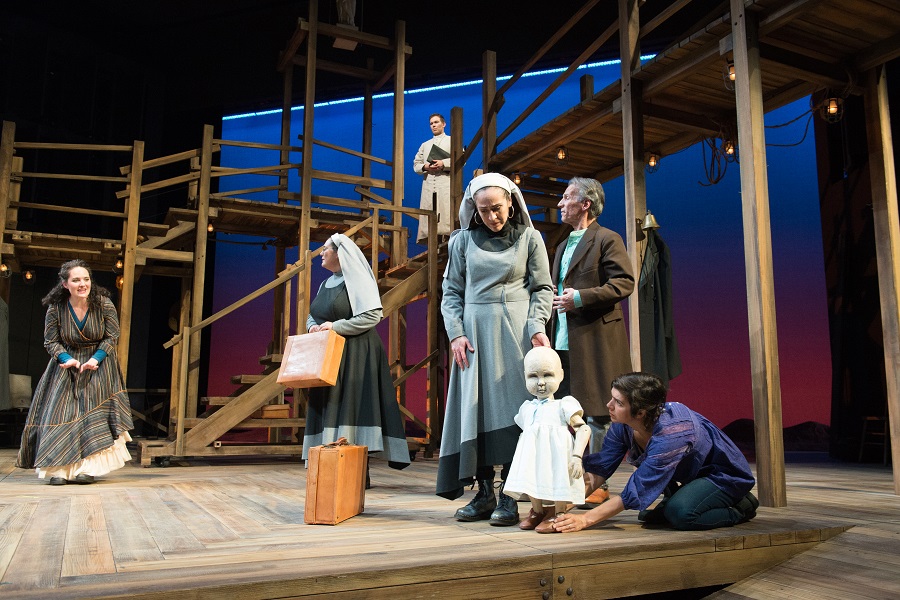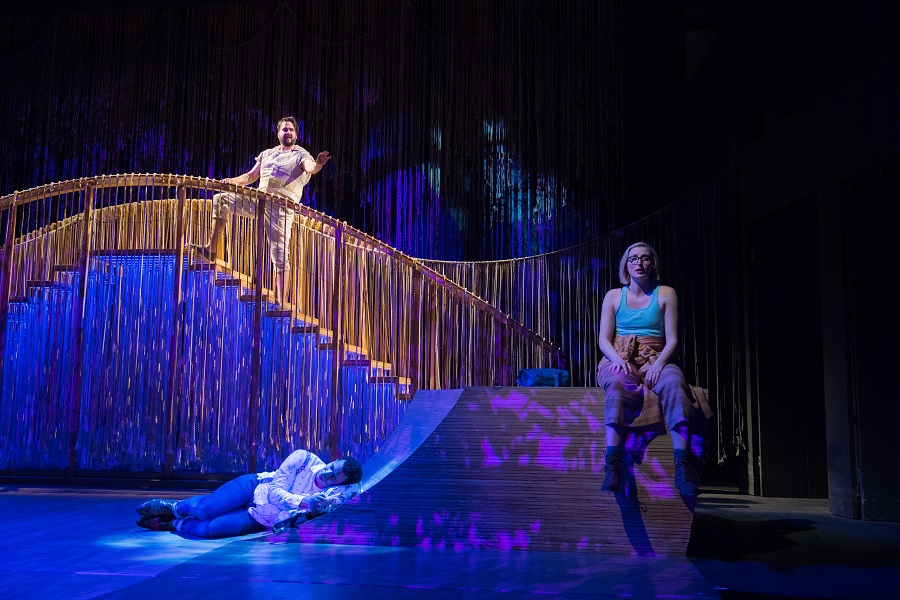As performing arts organizations struggle with financial losses from COVID-19, some have developed innovative strategies for a new era when online performances will be the norm.
For arts organizations across the state, the past few months have had no shortage of dramatic tension.
Crowd size restrictions have forced performance venues across the state to close their doors. The Oregon Symphony canceled all performances until 2021. Kevin Irving, artistic director of the Oregon Ballet Theatre, announced an indefinite halt to rehearsals and productions.
Just as things were looking grim, state lawmakers voted in July to divert $50 million in federal relief funding provided by the CARES Act to performing arts organizations. The Oregon Ballet Theatre will receive $630,000. Portland Center Stage at The Armory will receive $875,000 and $1.75 million is directed to the Oregon Symphony.
 The Copper Children (2020): Ensemble. Photo Jenny Graham, Oregon Shakespeare Festiva
The Copper Children (2020): Ensemble. Photo Jenny Graham, Oregon Shakespeare Festiva
The Oregon Shakespeare Festival received the largest slice of the funding with $4.7 million, although it will not come close to the $22 million the festival was projected to make in 2020.
The newly hired executive director of The Oregon Shakespeare Festival, David Schmitz, has not technically started in his position yet but that has not stopped him from looking to an era in which online performances could become a larger part of the festival’s offerings.
“Our goal is to make OSF a global brand and expand our international presence in a way that other theaters aren’t able to accomplish. Online performance is going to be a vital component to that,” says Schmitz.
“This was supposed to be a new way to engage our audience, then COVID happened, and it became the only way.”
On July 2 the festival launched O!, a digital platform which aired its first-ever streaming production of the Shakespeare play A Midsummer Night’s Dream. The platform was released ahead of schedule to help the company cope with the economic fallout from the pandemic.

A Midsummer Night’s Dream (2020): Jimmy Kiefer (Puck), William Thomas Hodgson (Demetrius), Royer Bockus (Helena). Photo Jenny Graham, Oregon Shakespeare Festival
Schmitz says the festival will look to other organizations that have successfully transitioned to the online space for inspiration, including The Stratford Festival, a Shakespearean company in Ontario, Canada, which has already created a robust streaming network and digital ticketing system.
While the money generated from online sales is nowhere near the box office revenue needed to sustain the festival at typical levels, Schmitz says the increased online presence will help keep audiences engaged while the institution weathers the storm.
“Theaters are not meant to be dark. Theaters are meant to be full of people,” says Schmitz. “The question is how do we ensure we are in the best place we can be 15 years down the road from now.”

A Midsummer Night’s Dream (2020): Nubia Monks (Hermia), Jonathan Luke Stevens (Lysander). Photo: Jenny Graham, Oregon Shakespeare Festival
Cynthia Fuhrman, managing director of Portland Center Stage, says her theater is using its rehearsal space to help artists record and stream online content, even though there are no plans to stream its latest production of The Curious Incident of the Dog in the Night-Time. At night, the theater is open to Black Lives Matter demonstrators to use the restroom.
Fuhrman says a COVID-19 vaccine will likely be the only way the theater will resume business as usual.
Even so, her organization is working with other performing arts venues to negotiate with the Screen Actors Guild and the American Federation of Television and Radio Artists to develop new contracts for actors who work on streaming projects.
“It used to be filmed versions of production were used as archival footage. Now that has begun to change and actors need a way to be compensated,” says Fuhrman.
Marci Crowson, artistic director of the Oregon Children’s Theater, says her organization usually offers summer theater classes for children. The pandemic means the theater has taken financial blows from all directions.
It is adopting a cautious approach to producing online content. Its first streaming show, The Girl Who Swallowed a Cactus, features a single actress who performs and streams the show from her real-life bedroom.
“We’re thinking about what investments will serve us long term, not just fill a void.” says Crowson. “We are feeling out what it means to think about theater in this era where people can’t sit next to each other.”
RELATED STORY: A New Kind Of Kids Book
On August 1 and 2, the theater will stream A Kid’s Play About Racism along with 36 other theaters, inspired by the popular “A Kids Book About” series, created by Portland writer Jelani Memory.
For some institutions, theater’s foray into the online space presents an opportunity as much as an obstacle.
The Artists Repertory Theater in Portland launched the Mercury Company on June 30 using funds distributed by the CARES Act. More than 50 artists, producers and technical staff were hired to create performance work designed for release online.
Some projects take advantage of the online nature of the performance, allowing audience members to connect directly with cast and crew before, after and even during the production.

Recording equipment at Artists Repertory Theatre. Photo: Shawn Lee
“The loan meant that we are able to sustain ourselves through the fiscal year, but we’re not sure how long this will continue,” says managing director J.S. May, who adds that high-quality performance will not be hindered by a digital space.
“If the work is good enough, whether it’s War of the Worlds in 1938 or Hamilton on Disney Plus, there is a threshold that the work can cross where it becomes a part of people’s lives. It’s extraordinary.”
The theater will begin releasing Mercury-created content during summer and fall of this year. Theater goers can purchase a flexible e-ticket that can be redeemed for viewings of Mercury Company shows, classes or for live shows when they return.

Mercury Company performer Jeff George leaps during a film shoot. Photo: Keith Sheffield
One of the Mercury projects is devised by a performance group in the company called Oxygen, which focuses on telling African American stories. The group’s title is a reference to ‘I can’t breathe,’ the last words of Eric Garner, who was killed in New York in 2014 after police put him in a chokehold.
May says the company is also in discussions with audio entertainment company Audible to distribute the recorded content after release.
Development and marketing director Kisha Jarrett, who worked as a director on two of the Mercury Company projects, says the Black Lives Matter demonstrations and the government response have made the need for art more urgent than ever.
“People who support Artists Rep do so because they want to support new work, support work by diverse voices and support work from local artists,” she says. “We are broadening what the artistic landscape in Portland looks like.”
To subscribe to Oregon Business, click here.







